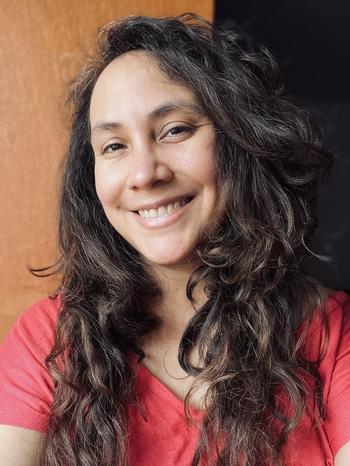Mara Christina Toledo Silva

International Research Training Group 'Temporalities of Future in Latin America'
PhD Candidate
Anthropology
Project: "Bodily and Affective Genealogies in the Intersex Experience: Desire, Love, and Anticipated Futures"
Education
| Since 11/2024 | PhD Candidate, at the Center for Research and Advanced Studies in Social Anthropology, Mexico City, CIESAS-CDMX. |
| Since 09/2021 | PhD student at the Center for Research and Advanced Studies in Social Anthropology, Mexico City, CIESAS-CDMX. |
| 08/2022- 01/2023 | Graduate in psychoanalysis from the College of Lacanian Psychoanalysis, A.C., Mexico City |
| 09/2019 – 08/2021 | Master’s degree in Social Anthropology at the Center for Research and Advanced Studies in Social Anthropology, Mexico City, CIESAS-CDMX. |
| 08/2014 – 08/2018 |
Bachelor’s degree in Physical Anthropology from the National School of Anthropology and History, Mexico City, ENAH. Bachelor’s degree in Philosophy from the Faculty of Philosophy, National Autonomous University of Mexico, UNAM. |
Work experience
| Since 05/2025 | Researcher, International Research Training Group ‘Temporalities of Future’, Berlin |
| Since 06/2025 |
PAPIIT Project IN40542 History and systematization of gender subjects at UNAM, Coordinator Dr. Mónica Quijano Velasco. |
| Since 10/2024 |
Professor of the Bachelor of Medicine and Surgery, Faculty of Medicine, National Autonomous University of Mexico, FACMED-UNAM. |
| Since 02/2019 | Subject Professor of the bachelor’s degree in physical Anthropology, National School of Anthropology and History, ENAH. |
| 05/2016- 02/2019 |
SNI Level III Research Assistant, El Colegio de México, A.C., COLMEX. |
| 06/2015- 07/2015 | Volunteer, Equality and Non-Discrimination Area of the Mexican Institute of Human Rights and Democracy A.C., IMDHD. https://imdhd.org/en/volunteering-and-social-service/ |
| 08/2015- 12/2015 | Internship, 1st Research Internship Program for university students. Diagnostic of public policies on equality and non-discrimination. At the Council to Prevent Discrimination, COPRED. |
Project: "Bodily and Affective Genealogies in the Intersex Experience: Desire, Love, and Anticipated Futures"
Over the last fifteen years, intersexuality[1] has been recognized as a social and human rights issue. It is a relatively new issue in social sciences. Most intersex individuals undergo processes of "medical normalization" to align their sexual anatomy with gender-based societal norms. These processes have a significant impact on the physical and emotional health of this population, often resulting in difficulty living a bearable life and imagining a different future. Some people share the challenges they face in pursuing their aspirations, such as having a romantic partner, starting a family, or continuing with a personal project that enables them to live independently. Meoded (2018)[2]argues that biomedical professionals systematically construct time frames under the fallacious assumption that children with intersex conditions will not face discrimination and violence when they become adults. From a socio-phenomenological perspective, Meoded (2018) proposes the concept of somatic time, which involves the relationship between time and soma, the clock, and the body's particular rhythms, according to which it grows, changes, and develops.
I ask myself how intersex people have dealt with anticipated futures dictated by their families and medical institutions throughout their lives. These futures generate problems about their place in the world and their recognition as human beings and subjects of rights. To this end, I analyze how body image is constituted in the intersex experience. I argue that body image constitution is genealogical because it is formed through hints or reminiscences narrated in experience. A problem arises here with respect to normative time as opposed to the temporalities that the subject inhabits. This is evident in the gaps they feel with respect to their age due to overprotection or the intensity of situations that deshumanize them. These situations continue to affect the present and the outline of a possible future. I summarize, though not exhaustively, the main events in the subjects' histories. I prioritize certain vital moments that create caesuras, which open predicaments that can be expressed as familiar sentences and anticipated futures. Additionally, I propose that bodily and affective rhythms—their experiential temporalities that are part of their bodily history—play an important role in processes of subjectivation and the possibility of imagining a future project.
[1] The UN fact sheet proposes that "intersex" is an umbrella term referring to variations in sexual characteristics, or corporealities that do not conform to the normative notions of male and female bodies. The fact sheet can be accessed via the following link: https://www.ohchr.org/sites/default/files/Documents/Issues/Discrimination/LGBT/FactSheets/UNFE_FactSheet_Intersex_SP.pdf
[2] Meoded, Limor (2018) "Time matters for intersex bodies: Between socio-medical time and somatic time”, en Social Science & Medicine, 208, 89–97.
Books
Toledo, Mara (2024) Intersexualidad y las paradojas de la humanización, México, Consejo Editorial de la Administración Pública Estatal, CEAPE.
Chapters (selection)
Toledo, Mara (2023) “Trayectividades intersexuales en clave ética: memorias etnográficas desde la escucha”, en Brújula. Voces de la intersexualidad en México. Octubre, 2023. Portal Diecisiete: https://diecisiete.org/actualidad/trayectividades-intersexuales-en-clave-etica-memorias-etnograficas-desde-la-escucha
Articles (selection)
Toledo, Mara (2022). Travesías narrativas de las experiencias intersexuales en México. Breve recorrido por la erótica y la violencia. Revista Ichan Tecolotl, (33):364. https://ichan.ciesas.edu.mx/travesias-narrativas-de-las-experiencias-intersexuales-en-mexicobreve-recorrido-por-la-erotica-y-la-violencia/?fbclid=IwAR3qyebzfxYAQh27WNJ4AzUdYw_8b2m8KWUenEwCqLPxO8a8IOkYTp_q-AM
Toledo, Mara (2018). De infortunios y esperanzas. Talleres de intersexualidad. Revista Dfensor, (3): 17-23. https://cdhdf.org.mx/wp-content/uploads/2018/07/dfensor_03_2018.pdf


